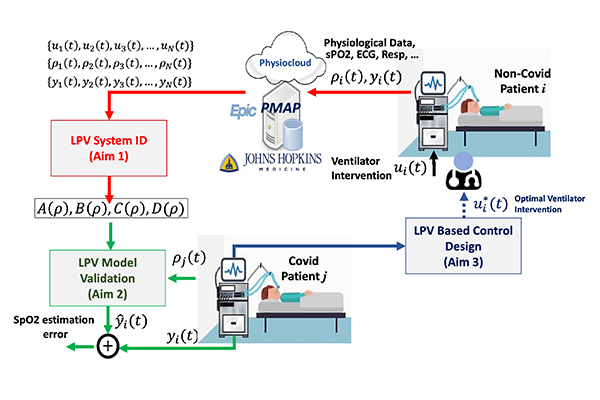Supported by a $200,000 National Science Foundation Rapid Response Research award, Johns Hopkins biomedical engineers Sridevi Sarma and Raimond Winslow are creating data-driven models to ensure that COVID-19 patients in intensive care units receive optimal ventilator therapy.
Through the RAPID award mechanism, the NSF is funding dozens of research projects to better understand and develop ways to respond to SARS-CoV-2, the virus that causes COVID-19.
Typical symptoms of the virus include cough, fever, upper and lower respiratory tract symptoms, and gastrointestinal symptoms. Among the most concerning is the life-threatening acute respiratory distress syndrome (ARDS), which results from a rapid decline in pulmonary function and often requires that patients be placed on ventilators to increase their oxygen saturation. Although a life-saving treatment for many COVID-19 patients, extended use of a ventilator can increase the risk of lung injury. In their study, Sarma, associate professor of biomedical engineering, and Winslow, the Raj and Neera Singh Professor of Biomedical Engineering, will develop models that can determine if and when a patient requires a ventilator, and predict how that patient will respond to ventilator therapy.
“This study takes a new approach in building patient-specific models that can predict when ventilation is necessary to administer to a COVID patient, and the effects of various ventilator settings,” explains Sarma. “The models, which belong to a class of Linear Parameter Varying (LPV), are novel to this medical application, and will be used to design optimal closed-loop ventilator strategies.”
Unlike other methods, these LPV models can provide clinicians with important information to help them make decisions related to patient care, such as what ventilator settings to use, how long the patient should be on the ventilator, or how the patient will respond to treatment over time, explains Sarma.
Their goal is to develop methods to control ventilators in real-time in order to more quickly and effectively maintain blood oxygen levels in patients with COVID-19. “While ventilators save lives, there is risk associated with being on a ventilator, so their optimal control will benefit all critically ill patients,” said Winslow.

